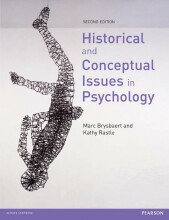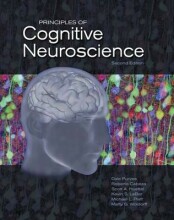Perceiving ourselves and others in organizations
55 important questions on Perceiving ourselves and others in organizations
Why do people stereotype?
- Need for self-enhancement
- Homogenization
- Differentiation
- Need for social identity
- Categorization
- Non-conscious energy saving
- Innate need to understand and anticipate
Which characteristics describe a self-concept?
- complexity
- consistency
- clarity
What are the problems with stereotyping?
- They are often inaccurate
- They sometimes create discriminatory attitudes and behaviour
- Stereotype threat
- Higher grades + faster learning
- Never study anything twice
- 100% sure, 100% understanding
What does the self-concept characteristic complexity refer to?
- number of distinct and important roles or identities that people perceive about themselves
- the extend of separation between multiple identities.
What is the Attribution Theory?
- External attribution;
- High consistency
- Low distinctiveness
- High consensus
- Internal Attribution:
- High consistency
- High distinctiveness
- Low consensus
What does the self-concept characteristic consistency refer to?
- when individual's identities require similar personality traits, values, and other attributes. high consistency
- some self-views require personal characteristics that conflict with personal characteristics in other self-views, low consistency
What does the self-concept characteristic clarity refer to?
Whit is consensus in the Attribution Theory?
What are the processes that shape self-concept?
- self-enhancement
- self-verification
- self-evaluation
- social self
What are attribution errors?
- Self-serving bias
- Fundamental attribution bias
What is the false-consensus effect?
What are the consequences of self-enhancement?
- experience better mental and phtysical health
- motivates persistence in difficult or risky tasks. due to can-do mindset
- people overestimate future returns in investments
- engage in unsafe behavior
- repeating poor decisions due to inability to receive feedback
- overestimate themselves in general.
What is Global Mindset?
- Global Perspective
- Complex info about novel environments
- Developing new multilevel mental models
How do we call a person's inherent motivation to confirm and maintain his or her existing self-concept?
How do we organize our perceptual information?
- Categorical thinking
- Filling in missing pieces
- Interpreting
- Mental models
What are the consequences of self-verification?
- people are more likely to remember information thaat is consistent with their self-concept
- high clarity self-concept people will dismiss feedback that contradicts their self-concept
- people are motivated to interact with people who affirm their self-views
How do we call the extend to which people like, respect and are satisfied with themselves?
How do we call a person's belief that he has the ability, motivation, correct role perceptions and favorable situation to complete a task succesfully
How do we improve our perceptions?
- Awareness of biases
- Improving self-awareness
- Meaningful interaction
How do we call a person's general belief about the amount of control he has over personal life events?
What are the problems with being taught about our biases?
- It might reinforce the biases
- It's ineffective when the biases are strong
At which three levels is our self-concept defined?
- personal traits, individual self
- connections to friends and coworkers, relational self
- membership in teams, organizations and other groups, collective self.
What defines social identity?
- how easily you're identified as a member of a reference group.
- your minority status in a group
- the group's status
What are the steps of the self-fulfilling prophecy?
- Supervisor forms an expectation
- Expectation affects the behaviour
- The behaviour affects the employee
- Employee becomes expectation
How do we call the process of receiving information about and making sense of the world around us?
How do we call the process of attending to some information received by our senses and ignoring other information?
What causes selective attention biases?
- expectations and assumptions about future events
- screening out information that is contrary to their beliefs
How do we call organizing people and objects into preconceived categories that are stored in our long-term memory?
Which forms of perceptual grouping are used to make sense of the world?
- categorical thinking
- anticipative thinking; filling in missing information
What are the basic processes to make sense of the world?
- selecting information
- organizing selected information
- interpreting organized information
How do we call the process of assigning traits to people based on their membership in a social category?
Which processes cause stereotyping as a reslut of self-enhancement and social identity?
- categorization; social identity is a comparitive process, thus categorize people
- homogenization; simplify comparing, people within each group are similar to each other
- differentiation; ascribe more favorable characteristics to people in our group compared to other groups.
What are the problems of stereotyping?
- stereotyping does not accurately describe every member of the stereotyped group
- stereotype-threat
- lays foundation for discrimination
How do we call the concept where an individual has a concern about confirming a negative stereotype about his group and therefor often does confirm it, due to diverted energy and atention causing inability to perform?
How do we call decision makers rely on stereotypes to establish notions of the ideal person in specific roles. a person who doesn't fit the ideal has to work twice as hard.
How do we call holding unfounded negative attitudes towards people from a particular group?
How do we call the preceptual process of deciding wether an observed behavior or event is caused by internal, or external factors?
Which attribution rule is described; does this person act this way in other situations?
Which attribution rule is described; do other people act this way in this situation?
Which sides of the three attribution rules get ascribed to external attribution?
- low consistency
- high distinctiveness
- high consensus
How do we call the tendency to see the person rather than the situation as the main cause for a person's behavior?
How do we call the perceptual process in which our expectations about another person cause the person to act more consistently with those expectations?
Describe the self-fulfilling prophecy cycle.
- supervisor forms expectations about the employee
- supervisor's expectations affect his behavior towards the employee
- supervisor's behavior affects the employee's ability, motivation, and self-confidence
- employee's behavior becomes more consistent with the supervisor's initial expectations
How do we call a perceptual error whereby our general impression of a person, usually based on one prominent characteristic, affects our our perception of other characteristics of that person?
How do we call the perceptual error in which we overestimate the extent to which others have beliefs and characteristics similar to ours?
What are two explanations for the false-consensus effect?
- we are comforted believing that others are similar to us
- we interact more with people who have similar views and behaviors, causing overestimating of how common those views and behaviors are in an entire organization or society
- we are more likely to remember information consistent with our own views
How do we call the perceptual error where we quickly form an opinion of people based on the first information we receive about them?
How do we call the perceptual error in which the most recent information dominates our perception of others?
How do we reduce perceptual biases and what are thye downsides of these solutions?
- creating awareness
- create self-awareness; being made aware of the biases, values, and strenghts you hold personally
- applying the johari window
How do we call a model of mutual understanding that encourages disclosure and feedback to increase our own open area and re4duce the blind, hidden and unknown areas of self-awareness.
Describe the components of the johari window.
- open area; known information about you, by you and others
- blind area; information that is know to others but not to you
- hidden area; information known to you but not to others
- unknown area; information known by no-one
- current self-awareness; open and hidden area.
Through which processes does the open area of the johari window increase?
- disclosure to others; informing others about yourself
- feedback from others; others informing you about yourself.
How do we call the hypothesis that state that the more we interact with someone the less prejudiced or perceptually biased we will be against that person?
How do we call a person's ability to perceive, appreciate and emphazise with people from other cultures and process complex cross-cultural information?
How do we call the abuse of power for private gain?
The question on the page originate from the summary of the following study material:
- A unique study and practice tool
- Never study anything twice again
- Get the grades you hope for
- 100% sure, 100% understanding
































